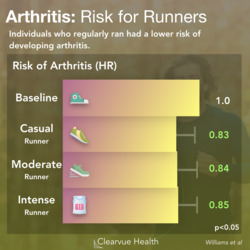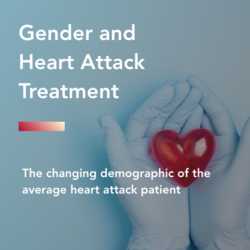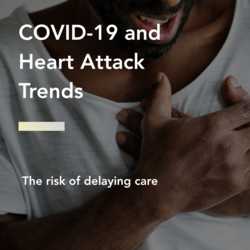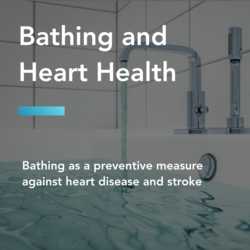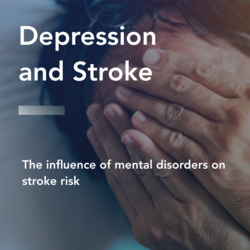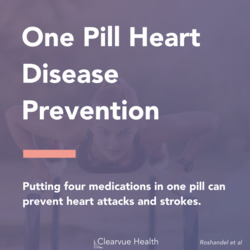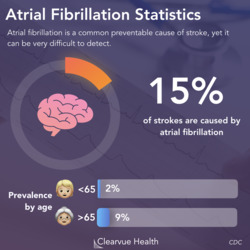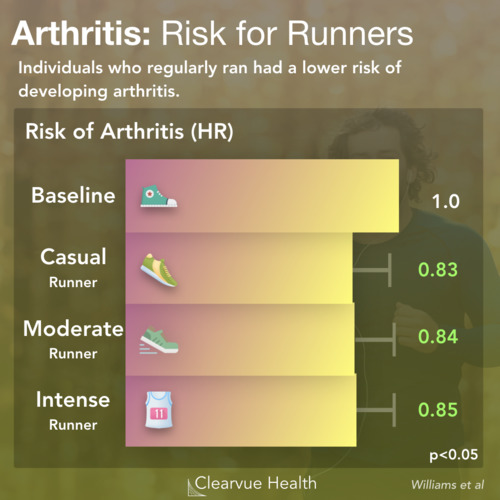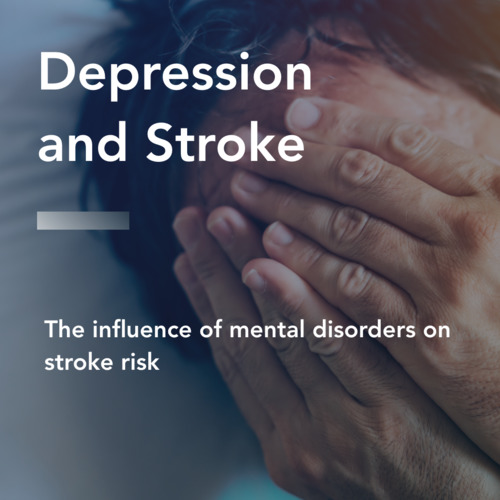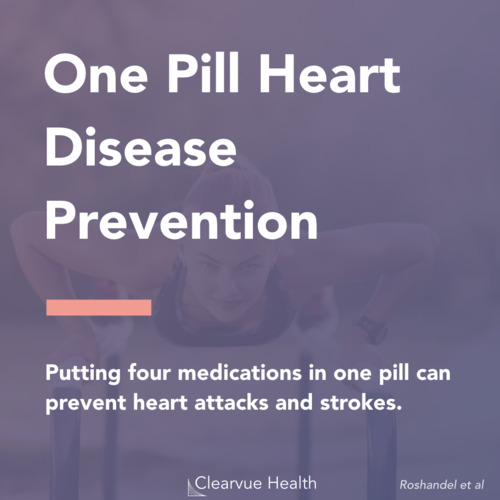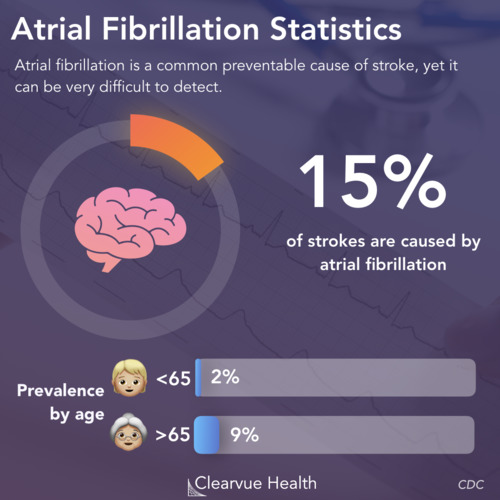Glucosamine and Cardiovascular Health

Figure 1: Glucosamine and Cardiovascular Health. A new study shows that glucosamine significantly reduces risk of heart disease and stroke. Individuals who took glucosamine had a 15% lower risk of any type of cardiovascular disease including heart disease and stroke and 9% lower risk of stroke specifically. The bars represent the risk compared to individuals who did not take glucosamine, on a scale of no risk to equivalent risk. Thin blue bars represent margins of error. Margins of error are not shown if they are smaller than the circular label.
While study results on supplements have been mixed so far, one supplement has been shown to potentially reduce heart disease and stroke, two of the biggest killers in the United States.
Glucosamine, a lesser known supplement that people take for arthritis, has been shown to have an unexpected positive effect on heart disease.
In a large study following 466,039 patients, those who took glucosamine had a 15% lower risk of all types of heart disease events, including heart attack, and a 9% lower risk of stroke.
For the most part, glucosamine has not been prescribed or recommended for heart health. However, with this new data, that might change soon.
Source: Association of habitual glucosamine use with risk of cardiovascular disease: prospective study in UK Biobank
Glucosamine and Heart Disease Risk

Figure 2: Glucosamine and Heart Disease Risk. A new study shows that glucosamine significantly reduces risk of heart attacks. Individuals who took glucosamine had an 18% lower risk of coronary heart disease. This included a 16% reduction in risk of non-fatal heart attacks and a 30% reduction in risk of fatal heart attacks. The bars represent the risk compared to individuals who did not take glucosamine, on a scale of no risk to equivalent risk. Thin blue bars represent margins of error. Margins of error are not shown if they are smaller than the circular label.
Patients taking glucosamine had a significant 18% reduction in their coronary heart disease risk, even after adjusting for age, sex, race, income, alcohol, physical activity, diet, diabetes, high blood pressure, high cholesterol, arthritis, and other medications.
Glucosamine also had a greater effect on fatal heart attacks compared to non-fatal heart attacks, which suggests that glucosamine may reduce the severity of heart attacks alongside preventing them.
In Coronary Heart Disease, blood vessels slowly narrow reducing the diameter in which blood can flow through. Over time, coronary artery disease can lead to complete blockage of a blood vessel, which causes heart cells to be starved of oxygen. This is known as a heart attack.
Source: Association of habitual glucosamine use with risk of cardiovascular disease: prospective study in UK Biobank
Glucosamine and Stroke Risk

Figure 3: Glucosamine and Stroke Risk. A new study shows that glucosamine significantly reduces risk of stroke. The overall risk of stroke was reduced by 9% after multivariate adjustment. The subcategories of stroke risk were not statistically significant after multivariate adjustment. The data above show the unadjusted risks. Generally, glucosamine had a greater effect on ischemic strokes compared to hemorrhagic strokes. The bars represent the risk compared to individuals who did not take glucosamine, on a scale of no risk to equivalent risk. Thin blue bars represent margins of error. Margins of error are not shown if they are smaller than the circular label.
When it comes to stroke, the data is less clear. But what we do know is that overall, after adjusting for potentially confounding variables, there is a significant 9% reduction in stroke risk.
After adjustment, the individual subtypes of stroke were not statistically significant. However looking at the unadjusted data, we can see some interesting patterns.
Most of the benefits for stroke were found in ischemic strokes. Ischemic strokes have a mechanism that is similar to heart attack. Just like heart attacks, these are caused by blood clots blocking off blood flow to the brain, starving your brain cells of oxygen. This occurs because of atherosclerosis, the same process behind coronary heart disease.
Mechanism: Glucosamine may reduce inflammation

Figure 4: Glucosamine may reduce inflammation. Glucosamine may reduce inflammation as measured by C Reactive Protein, a molecule in your blood that's used to measure inflammation. This data was obtained from 9,947 patients in a prospective cohort study.
Since this is such a new and surprising finding, there isn’t much information yet on the mechanism. However, one of the mechanisms that the authors of the study suggested is a reduction in inflammation.
In a previous study, researchers found that those who took glucosamine had a significant reduction in their C-Reactive Protein. This is a blood biomarker for inflammation. A lower level of C-Reactive Protein suggests that patients who took glucosamine had a lower average level of inflammation in their body.
Source: Association between use of specialty dietary supplements and C-reactive protein concentrations
Key Takeaways & Study Weaknesses
The strength of this data is truly quite exciting and suggests that we might just have a new dietary supplement that is safe and effective for arthritis and heart disease prevention.
We rate this study as a 3/5. It had good methods and provided compelling data. However, before this is put into clinical practice, this will likely have to undergo more study to confirm whether glucosamine is responsible for the decreased risk.
+
+
Sample Size - This study used a very large sample set which increases the validity of the results.
+
Variable Adjustment - The study adjusted for age, sex, race, income, alcohol, physical activity, diet, diabetes, high blood pressure, high cholesterol, arthritis, and other medications.
+
Strength of Findings - This study found significant and clinically relavent effects.
-
Data Collection - This study used survey data which is prone to bias.
Limitations of Self-Reported Data
Much of the data in this nutrition and heart health study is self-reported, which has several limitations and sources of bias. Self-reported data, which is obtained through surveys and questionnaires, is the most feasible way of collecting data from large subsets of the population. However, the data may suffer from recall bias, where respondents may forget certain details or may not accurately remember details. They may also suffer from social desirability bias, where respondents may be reluctant to admit to socially undesirable behaviors, even if the survey is anonymous.
MedlinePlus
Glucosamine sulfate is a chemical found in the human body. It is used by the body to produce a variety of other chemicals that are involved in building tendons, ligaments, cartilage, and the thick fluid that surrounds joints. Glucosamine sulfate is LIKELY SAFE when used appropriately by mouth in adults.
National Center for Complementary and Integrative Health
No serious side effects have been reported in large, well-conducted studies of people taking glucosamine, chondroitin, or both for up to 3 years. However, glucosamine or chondroitin may interact with the anticoagulant (blood-thinning) drug warfarin (Coumadin). Glucosamine might affect the way your body handles sugar, especially if you have diabetes or other blood sugar problems, such as insulin resistance or impaired glucose tolerance.
Clearvue Health is not affiliated with above organizations. The information above is provided to highlight and link to useful further reading.







